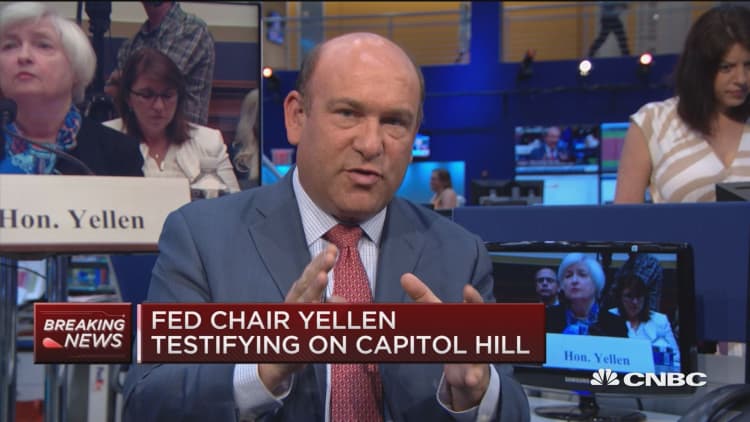
Fed Chair Janet Yellen rejected the notion that the Fed has a "third pillar" of policy to keep stock market prices afloat.
On the second day of her semiannual congressional testimony Wednesday, Yellen was asked by Rep. Edward R. Royce, R-Calif., whether the U.S. central bank's monetary policy is tied to boosting Wall Street's equity values — in effect a "third pillar" to go along with the Fed's dual mandate of full employment and price stability.
"We do not target the level of stock prices," she said. "That is not an appropriate thing to do."
The Fed has enacted three rounds of so-called quantitative easing, a monthly bond buying program that has seen its balance sheet soar to $4.5 trillion. The last round of QE ended in October 2014. Each round has seen a sharp rise in the stock market.
Though the Fed is out of the easing business for now, it has kept its interest rate target close to zero, hiking just once in the last 10 years. Each signal that the Fed is about to tighten policy has resulted in market volatility, prompting Royce to ask whether the central bank will be cowed by jangled nerves on Wall Street.
"We're going to look at what the trajectory is for the economy, for the goals Congress has assigned us, namely inflation and maximum employment, and take policies we think are appropriate to foster them," Yellen said.
However, Rep. Scott Garrett, R-N.J., charged that the Fed's policies have been targeted toward helping "the rich over the poor" by implementing policies that boost the market, where most of the value is held by the wealthiest people. He did not give Yellen a chance to respond.
In other matters, Yellen said she believes the recent weakness in job creation is "transitory" and does not reflect an otherwise growing economy.
The central bank chief sounded more optimistic than she has over the past couple of weeks, a time during which the Fed backtracked on what had been an aggressive path forward for interest rates.
"We are seeing a pickup in growth. There's been a sharp increase in consumer spending," Yellen told the House Financial Services Committee. "I'm very hopeful that we will see a pickup in growth. We will be watching for that as we assess the economy."
Yellen spoke a week after the Federal Open Market Committee slashed its expectations for future rate hikes. That decision in turn followed a much weaker-than-expected May jobs report, which showed that nonfarm payrolls increased by just 38,000.
In other matters:
- Yellen faced aggressive questioning over the why the rate the Fed pays for reserves that banks store at the central bank is higher than the overnight funds rate. Committee Chairman Jeb Hensarling, R-Texas, said that violates a congressional statute.
- Questioned whether the Fed should "stress test" its $4.5 trillion balance sheet, Yellen said she does not believe that is necessary, though the Fed already has done so.
- Contrary to GOP criticism, Democratic members praised Yellen and the Fed. "Under your leadership, we have seen a Federal Reserve that cares about American workers and families and has made tremendous progress on their behalf," said Rep. Maxine Waters of California.
- Small banks will be getting help from some changes in the Fed's regulatory regime.
- The chair rejected an assertion that regulations are at the root of why few new banks are opening. "I'm not aware of any studies that suggest regulation is responsible for that," she said.
- Rep. Bill Foster, D-Ill., asked Yellen whether she would weigh in on a Moody's Analytics study that predicted a lengthy recession if presumptive Republican presidential nominee Donald Trump's economic proposals are enacted. Yellen demurred, saying "We are a nonpartisan organization and I don't want us, either me as the leader or our organization, to be involved in analyzing partisan issues."
On the jobs issue, Yellen said the economy has created "a lot of high-end jobs." She also said a generational low in labor force participation primarily is the result of an aging labor force, meaning that the decline in the rate could continue. The current participation rate is 62.6 percent, the lowest since December and near the worst since late-1977.
In addition to the weak May, the economy created just 123,000 positions in April and 186,000 in March. The May total was the worst month since September 2010.
The headline unemployment rate is at 4.7 percent and has fallen in good part due to the declining participation level. A measure that includes those not actively seeking work are holding part-time jobs for economic reason is at 9.7 percent, well above prerecession levels. Asked to give a level in the latter rate that would indicate full employment, Yellen declined, though she said the headline level is near that point.


